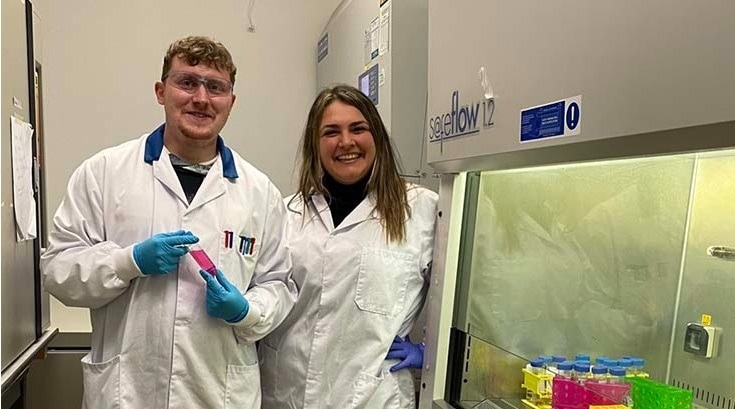Researchers from the University of Galway have reported a new discovery that could enhance treatment options for superbug MRSA infections using penicillin-type antibiotics that have proven ineffective on their own.
 Aaron Nolan, a PhD student at the University of Galway and Dr Merve S Zeden from the School of Biological and Chemical Sciences, University of Galway. Image Credit: University of Galway
Aaron Nolan, a PhD student at the University of Galway and Dr Merve S Zeden from the School of Biological and Chemical Sciences, University of Galway. Image Credit: University of Galway
The findings were reported in mBio, the flagship journal of the American Society for Microbiology.
The research was headed by Professor James P O’Gara and Dr Merve S Zeden from the University of Galway’s School of Biological and Chemical Sciences.
This discovery is important because it has revealed a potentially new way to treat MRSA infections with penicillin-type drugs, which remain the safest and most effective antibiotics.”
James O’Gara, Professor, Microbiology, School of Biological and Chemical Sciences, University of Galway
Antimicrobial resistance (AMR) is one of the most serious threats to human health, with superbugs such as MRSA exerting a substantial strain on global healthcare resources.
When paired with purines, which are the building blocks of DNA, the microbiology research group at the University of Galway demonstrated that penicillin-type antibiotics may eliminate MRSA far more effectively.
Purine nucleosides, Adenosine, Xanthosine, Guanosine are sugar versions of the building blocks of DNA, and our work showed that they interfere with signaling systems in the bacterial cell which are required for antibiotic resistance.”
Dr Merve S Zeden, School of Biological and Chemical Sciences, University of Galway
This research was recently featured in the American Society for Microbiology’s This Week in Microbiology (TWiM) podcast.
Purine-derived drugs are already being used to treat several viral infections and malignancies, according to the discussion.
Finding new ways to re-sensitize superbugs to currently licensed antibiotics is a crucial part of efforts to tackle the AMR crisis. Our research implicated the potential of purine nucleosides in re-sensitizing MRSA to penicillin-type antibiotics”
Aaron Nolan, Study Co-First Author and PhD Student, University of Galway
Source:
Journal reference:
Nolan, A. C., et al. (2022) Purine Nucleosides Interfere with c-di-AMP Levels and Act as Adjuvants To Re-Sensitize MRSA To β-Lactam Antibiotics. mBio. doi.org/10.1128/mbio.02478-22.